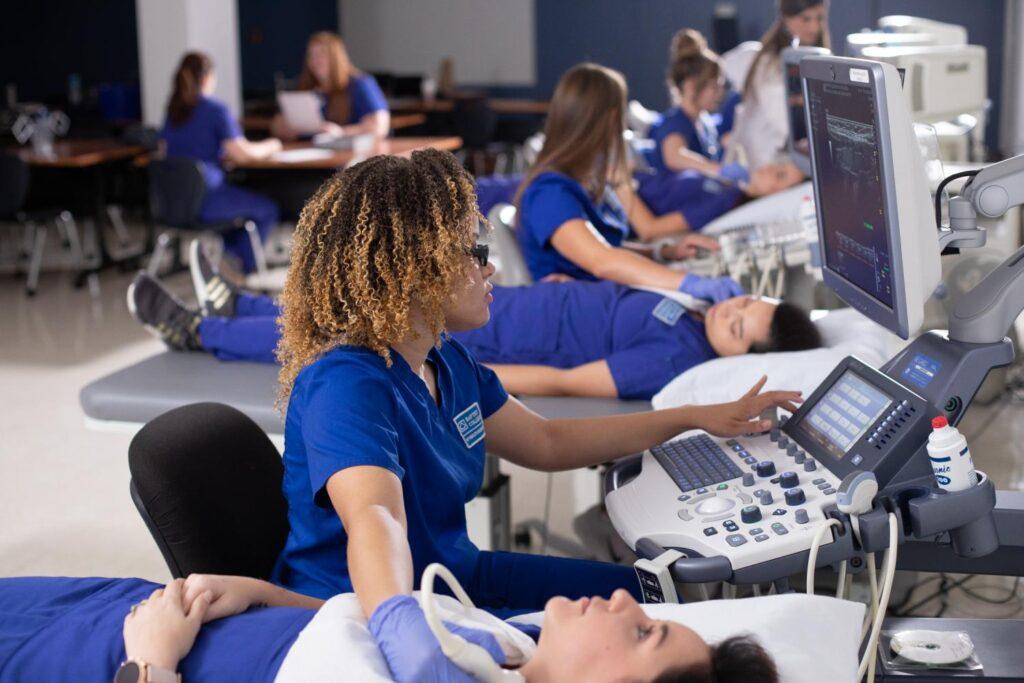Ultrasound technicians employ imaging equipment to capture images of body tissues. Working alongside physicians and other medical professionals, they help diagnose diseases or health concerns. Many programs provide various options for those interested in becoming ultrasound technicians. From certificate programs to associate’s degrees, attending an accredited ultrasound tech school will help prepare you for certification exams.
Complete Info on Getting Started
Orientation provides new students an ideal chance to familiarize themselves with school expectations, policies and procedures and address any outstanding queries with administration and professors.
Most ultrasound tech programs involve classroom and lab-based coursework covering physics, anatomy and physiology. Certain degrees also offer speciality courses on vascular sonography or adult echocardiography, depending on the institution.

As part of their curriculum, many programs offer clinical rotations that give students real-life experience in medical environments, allowing them to apply their knowledge of sonography principles and practices in real-life settings. This enables students to become skilled professionals.
Some certificate programs last only 1-2 years and provide basic sonography training; other add-on programs to 4-year healthcare degrees provide more in-depth sonography education and career advancement opportunities. Whatever degree level, accredited program accreditation is crucial to future job success: employers prefer candidates who attended accredited schools when hiring.
Some ultrasound students opt to shadow a working professional in their area, which gives them a real-life glimpse of life as an ultrasound technician; it may also help students determine which speciality best fits them. Sometimes, a mentor can be assigned; such guidance could prove invaluable throughout studies and professional experiences.
Core Courses
Acquiring formal education through an accredited program is the cornerstone of becoming an ultrasound technician. An associate degree typically takes 24 months, although certificate programs may also provide useful training options for those already trained in another medical field or those looking to specialize in one aspect of sonography.
As part of your associate degree studies, during your initial two years, you’ll take core courses like anatomy and physiology and lab courses on sonography technology such as medical terminology, vascular sonography, ultrasound physics and transducer technology.
Core classes cover topics like reading medical records and communicating with patients, while most of your coursework will revolve around sonography topics like pediatric, breast and gynecologic sonography. Depending on your school, clinical rotations also provide opportunities to hone your sonography skills in real-world settings.
Other classes typically taught include obstetrical sonography, abdominal and superficial sonography and advanced ultrasound physics. Vascular sonography is another popular topic since ultrasounds can help diagnose various vascular diseases, including arterial disease and deep vein thrombosis. You’ll learn to read Doppler signals to identify blood flow problems within arterial and venous systems.
Specialty Courses
Your ultrasound degree program will offer courses beyond basic subjects like physics, anatomy and physiology to deepen your understanding of sonography science. Common courses focus on abdominal and superficial structures, obstetrics and gynaecology, vascular imaging and echocardiography.
Other courses cover patient care and medical administration, fetal development and growth, transducer instrumentation, sonographic pathology and advanced ultrasound techniques. Furthermore, some programs also offer basic life support (BLS) certification training that teaches how to administer resuscitation to someone who stops breathing or experiences an irregular heartbeat.

Medical sonographers are in high demand, finding work at hospitals and doctor’s offices nationwide. According to the Bureau of Labor Statistics projections, jobs for medical sonographers will grow 14% by 2030 – more than any other career path!
Educational requirements to become a medical sonographer differ depending on your state. Still, an associate degree in diagnostic medical sonography is most frequently needed for entry-level careers in this healthcare field. Completion typically takes 24 months. An associate degree also makes a great starting point for those interested in pursuing bachelor’s degrees related to healthcare; some schools allow transfer credits from an associate degree program into bachelor’s programs to reduce tuition, housing, and meal costs significantly.
Clinical Experience
Dependent upon their program, students will gain hands-on ultrasound equipment experience in sonography labs and clinical internships, allowing them to apply what they learn in class to real patients in an authentic setting. Many reputable programs require or strongly encourage their students to complete an externship or internship experience, supporting professional certification with the ARDMS.
As you research ultrasound technician schools, consider course offerings, tuition costs and job prospects for graduates of each program. Also, ensure CAAHEP accredits it so you can ensure your curriculum and facilities meet high-quality standards.
Medical sonographers are essential in providing accurate diagnoses and effective treatments to their patients. According to the Bureau of Labor Statistics, employment opportunities for these professionals are expected to expand by 14% over the next decade.
An associate degree in medical sonography is often the preferred route into this rewarding yet difficult field, although bachelor’s degrees and speciality certificates also exist. When choosing your degree level, look for programs with small class sizes so you have access to personalized instruction and mentorship – this will ensure that you can succeed on this challenging but fulfilling path to a rewarding career path.

